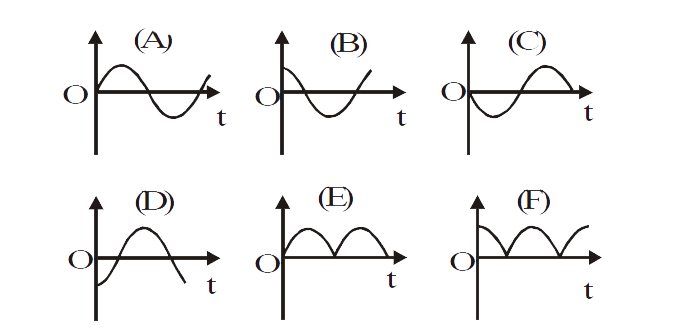The displacement of a particle in S.H.M is in opposite phase with
A
Velocity
B
Acceleration
C
Amplitude
D
Frequency
Text Solution
The correct Answer is:B
|
Topper's Solved these Questions
- OSCILLATIONSBOOK - AAKASH SERIESCHAPTER - OSCILLATIONSEXERCISE - EXERCISE II
175 Videos
- OSCILLATIONSBOOK - AAKASH SERIESCHAPTER - OSCILLATIONSEXERCISE - Practice exercise
140 Videos
- OSCILLATIONSBOOK - AAKASH SERIESCHAPTER - OSCILLATIONSEXERCISE - PROBLEM
249 Videos
- OSCILLATIONBOOK - AAKASH SERIESCHAPTER - OSCILLATIONEXERCISE - QUESTIONS FOR DESCRIPTIVE ANSWERS
12 Videos
- PHYSICAL WORLDBOOK - AAKASH SERIESCHAPTER - PHYSICAL WORLDEXERCISE - VERY SHORT ANSWER TYPE QUESTIONS
5 Videos
Similar Questions
Knowledge Check
The displacement of a particle in S.H.M. in one time period is
AAB2AC4ADZeroThe displacement of a particle in S.H.M. is given by x=sinωt+√3cosωtm. Then at t = 0 its displacement in metres is
A0.5B√3C1D1/√2The displacement of a particle in S.H.M. is given by x=Bsin(ωt+α). The initial position (at time t=0), of the particle is the initial phase angle if the angular frequency of the particle is πrad/s ?
Aπ2Bπ4Cπ6Dπ5
The displacement of a particle performing S.H.M. is given by x=10sin(ωt+α) metre. If the displacement of the particle is 5m, then the phase of S.H.M. is
View SolutionThe phase of a particle in S.H.M. is π/2, then :
View SolutionThe displacement of a particle performing a S.H.M. is given by x=12cos(ωt+α)cm. If at time t, the displacement of the particle is 6 cm, them the phase of the particle at that instant is
View SolutionThe displacement of a particle performing S.H.M. is x = 3 sin (314 t) + 4 cos (314 t). Then the initial phase angle is,
View SolutionThe displacement of a particle making S.H.M. is given by x=6cos(100t+π4)m then the frequency is
View Solution

